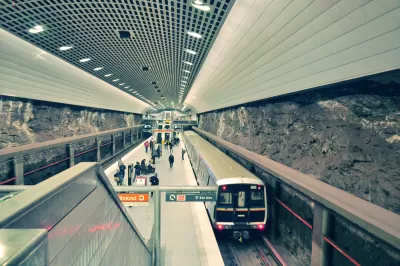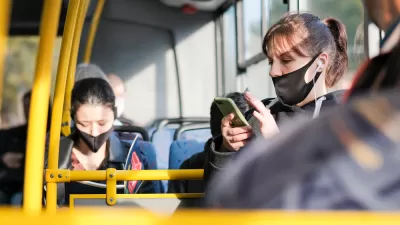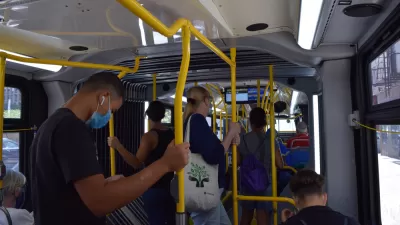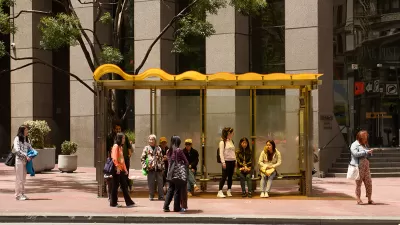After seeing dramatic cuts in service and ridership during the pandemic, transit agencies have a small window of opportunity to gain and retain regular passengers.

Because "we’re in the midst of an unprecedented period when millions of people are reevaluating their travel habits," writes David Zipper for Bloomberg CityLab, now is the time for transit agencies to radically rethink their strategies for attracting and retaining passengers. "If there is ever a time for local leaders to nudge residents toward transit and away from driving, this is it."
Zipper recommends several tactics for getting more people on buses and trains, such as offering free tickets, multimodal rewards, touchless payments, and emergency car rides for regular riders, a service implemented by several agencies before the pandemic. "These programs provide a kind of insurance if a rider urgently needs to travel at a time when bus or train service is unavailable (i.e., a mid-day trip to pick up a sick child at school, or a ride home after unexpectedly needing to work late). Ideally, they will enable more residents to opt for transit, secure in the knowledge that they can handle a sudden emergency without breaking their travel budget."
Zipper cautions, however, that while these small fixes can help make transit more accessible and more attractive, "[p]retty much everyone agrees that the key to sustained transit ridership growth is providing reliable, frequent and accessible service. Thankfully, an infusion of federal funds has now allowed many agencies to bring service back to pre-pandemic levels."
FULL STORY: 4 Ways Transit Can Lure Back Post-Covid Commuters

Alabama: Trump Terminates Settlements for Black Communities Harmed By Raw Sewage
Trump deemed the landmark civil rights agreement “illegal DEI and environmental justice policy.”

Study: Maui’s Plan to Convert Vacation Rentals to Long-Term Housing Could Cause Nearly $1 Billion Economic Loss
The plan would reduce visitor accommodation by 25% resulting in 1,900 jobs lost.

Planetizen Federal Action Tracker
A weekly monitor of how Trump’s orders and actions are impacting planners and planning in America.

Waymo Gets Permission to Map SF’s Market Street
If allowed to operate on the traffic-restricted street, Waymo’s autonomous taxis would have a leg up over ride-hailing competitors — and counter the city’s efforts to grow bike and pedestrian on the thoroughfare.

Parklet Symposium Highlights the Success of Shared Spaces
Parklets got a boost during the Covid-19 pandemic, when the concept was translated to outdoor dining programs that offered restaurants a lifeline during the shutdown.

Federal Homelessness Agency Places Entire Staff on Leave
The U.S. Interagency Council on Homelessness is the only federal agency dedicated to preventing and ending homelessness.
Urban Design for Planners 1: Software Tools
This six-course series explores essential urban design concepts using open source software and equips planners with the tools they need to participate fully in the urban design process.
Planning for Universal Design
Learn the tools for implementing Universal Design in planning regulations.
Caltrans
Smith Gee Studio
Institute for Housing and Urban Development Studies (IHS)
City of Grandview
Harvard GSD Executive Education
Toledo-Lucas County Plan Commissions
Salt Lake City
NYU Wagner Graduate School of Public Service





























